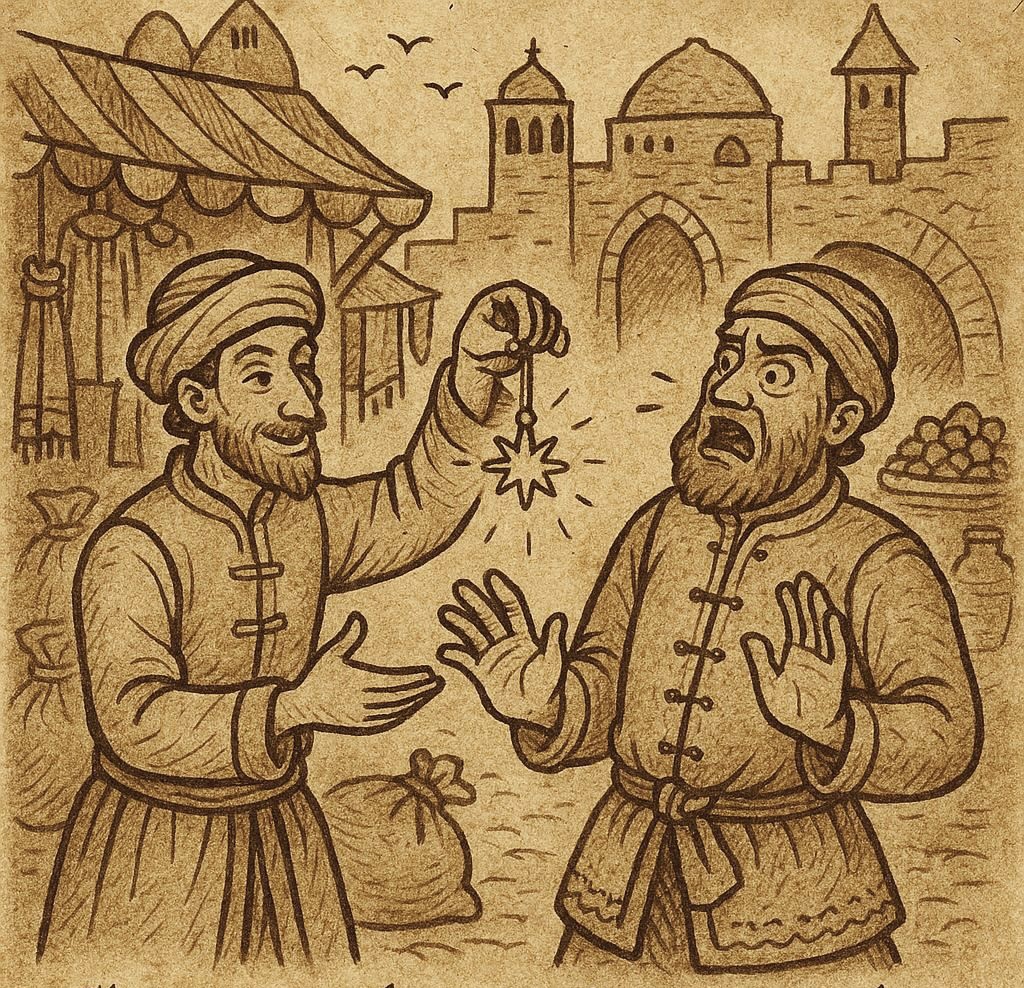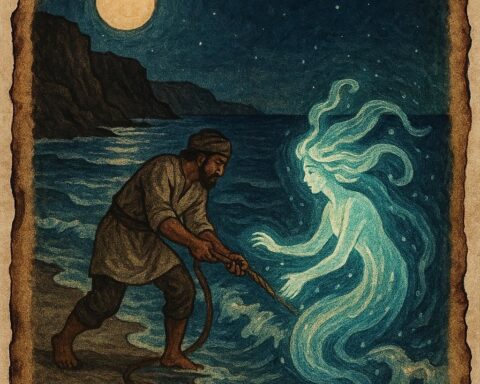In the heart of Tripoli, where the sun beat down upon the narrow streets and the scent of spices mingled with the salty air of the Mediterranean, there lived a cunning merchant. Known simply as the Trickster, he was not the richest trader in the market, nor the strongest, but he possessed a mind sharp as a blade and a wit that could outmatch even the most greedy rivals. His small shop, tucked between bustling stalls of silk and pottery, was humble, yet every day, curious shoppers and fellow merchants alike sought his clever solutions and unusual goods.
The Trickster understood that Tripoli’s market was not merely a place of trade but a stage where character and intelligence were tested. Greedy merchants often tried to cheat their customers or steal from one another, believing that force or deceit alone could bring success. But the Trickster believed differently: fairness, cunning, and cleverness could achieve justice while also earning respect. He spent his mornings studying the patterns of trade, observing how merchants set prices, how buyers reacted, and where opportunities for clever tricks could be used to teach lessons.
READ THIS: The Tale of the Goat’s Enchantment
One morning, a particularly greedy trader arrived at the market. He boasted of possessing the finest dates in all of Tripoli and declared that no one could match his prices or quality. He ridiculed the other merchants, accusing them of selling substandard goods, and threatened to drive anyone who opposed him out of the market. The Trickster listened quietly, a small smile playing at the corners of his lips, and concocted a plan. He knew that brute threats could not match his cleverness, and he intended to show that wit was a far more powerful tool than greed.
The next day, the Trickster set up his stall with ordinary goods, a simple basket of dates, some grains, and a few earthenware pots. Yet he did not display them plainly. Instead, he placed a small, shiny amulet above the basket and told passersby that it would bring prosperity and good luck to any merchant who purchased from him. The greedy trader, unable to resist the lure of advantage and blinded by his own arrogance, approached the stall.
“I see you claim magic for your humble goods,” the greedy merchant scoffed. “I have no need for charms; my wealth is already greater than yours.”
The Trickster bowed politely. “Ah, but this amulet reveals who truly values honesty in trade. Only those with a pure heart will benefit from its power. Perhaps you may wish to test it?”
Curiosity and pride got the better of the greedy trader. He bought a basket of dates and placed the amulet atop his stall, convinced it would increase his fortune. That afternoon, the Trickster circulated a rumor that merchants who relied solely on wealth or intimidation would find their goods spoiled by the amulet’s magic if their hearts were greedy. By sunset, the trader returned in panic. He discovered that some of his prized dates had rotted mysteriously, while his rivals’ goods remained untouched. Confused and fearful, he confronted the Trickster.
“Did you curse my dates?” he demanded.
The Trickster shook his head, feigning innocence. “The amulet rewards virtue and punishes greed. Perhaps it is not I who cursed your goods, but your own actions that have brought this misfortune.”
Humiliated and enlightened, the greedy trader realized that cunning and fairness could triumph over mere power and avarice. From that day on, he treated both customers and fellow merchants with respect, and his business improved not because of magic but because he had learned a lesson in morality and cleverness.
The Trickster continued his life in Tripoli’s bustling market, always observing, teaching, and occasionally playing clever tricks to remind others that fairness, intelligence, and wit were the true currency of success. The market became a place where greed was tempered by cunning, and where those who tried to exploit others were often humbled by the clever merchant whose mind was sharper than any sword.
Even years later, traders would recount tales of the Trickster of Tripoli Market, whose cleverness had not only brought prosperity to himself but also taught justice and morality in trade. His story became a timeless reminder that intelligence and integrity could overcome greed, and that those who relied solely on force or deceit were bound to face their own folly.
Moral Lesson
This story teaches that intelligence, cleverness, and fairness can triumph over greed and arrogance. True success comes not from force or deceit but from wit, integrity, and the careful application of knowledge.
Knowledge Check
Who was the main character in the story?
A cunning merchant known as the Trickster, who used intelligence to outwit greedy rivals.What did the greedy trader believe would ensure his success?
He believed that wealth and intimidation alone could dominate the market.How did the Trickster teach the greedy trader a lesson?
He used a clever trick with an amulet and rumors to reveal the consequences of greed.What lesson did the greedy trader learn?
That fairness, cleverness, and integrity are more powerful than greed and force.What themes are highlighted in The Trickster of Tripoli Market?
Cleverness, justice, morality in trade, and the triumph of wit over greed.Why did the Trickster continue to play clever tricks in the market?
To teach lessons, promote fairness, and remind others that intelligence and integrity bring lasting success.
Source: Libyan tale. Collected by Hans Stumme in Tales and Poems from the City of Tripoli (1898).






